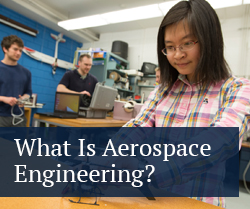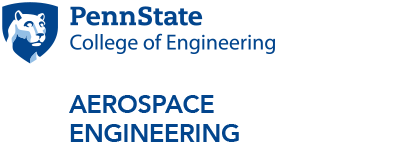
What is Aerospace Engineering?
Aerospace engineers focus on designing, developing, testing, and producing aircraft, spacecraft, and related systems and equipment. The field has traditionally focused on problems related to atmospheric and space flight, with two major and overlapping branches: aeronautical engineering and astronautical engineering.
Aeronautical engineering focuses on the theory, technology, and practice of flight within the earth’s atmosphere.
Astronautical engineering focuses on the science and technology of spacecraft and launch vehicles.
What does an aerospace engineer do?
Aerospace engineers develop leading-edge technologies and integrate them into aerospace vehicle systems used for transportation, communications, exploration, and defense applications. This involves the design and manufacturing of aircraft, spacecraft, propulsion systems, satellites, and missiles, as well as the design and testing of aircraft and aerospace products, components, and subassemblies.
Successful aerospace engineers possess in-depth skills in, and an understanding of, aerodynamics, materials and structures, propulsion, vehicle dynamics and control, and software.
Where do aerospace engineers work?
Aerospace engineers work primarily in the aerospace industry, at systems and software suppliers, corporate labs, government labs, and universities. The skill set of aerospace engineers is extremely broad and multidisciplinary, and the experience of aerospace engineers as systems architects and engineers allows them to make contributions in many diverse sectors.
According to the Bureau of Labor Statistics, the industries that employed the most aerospace engineers in 2024 were:
- Aerospace product and parts manufacturing
- Architectural, engineering, and related services
- Federal, state, and local government
- Scientific research and development services
- Navigational, measuring, electromedical, and control instruments manufacturing
What kind of salary does an aerospace engineer earn?
According to the Bureau of Labor Statistics, the median annual wage for aerospace engineers was $130,720 in 2023. The median annual wages for aerospace engineers in the top industries in which they worked were as follows:
- Federal government, excluding postal service = $133,040
- Navigational, measuring, electromedical, and control instruments manufacturing = $135,280
- Research and development in the physical, engineering, and life sciences = $136,620
- Engineering services = $128,870
- Aerospace product and parts manufacturing = $130,720
The average annual starting salary for Penn State Aerospace Engineering 2022-23 undergraduates was $78,509.*
*The average annual starting salary information was provided on a voluntary basis by undergraduate engineering students who completed their Senior Exit Survey.

- Undergraduate Degree Program
- Suggested Academic Plan
- Financial Aid and Scholarships
- Honors Program
- Co-ops and Internships
- Research and Teaching Opportunities



